【通用版】小升初英语复习:时态-考点解读与专项训练(Word版,含答案)
小升初英语 时态 句型 完型填空与阅读理解专题 考点 知识点 详细分析讲解 最新版
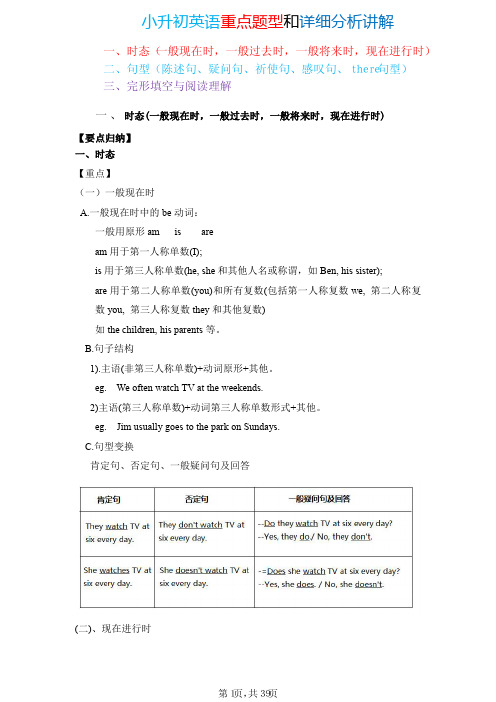
小升初英语重点题型和详细分析讲解一、时态(一般现在时,一般过去时,一般将来时,现在进行时)二、句型(陈述句、疑问句、祈使句、感叹句、there句型)三、完形填空与阅读理解【要点归纳】一、时态【重点】(一)一般现在时A.一般现在时中的be 动词:一般用原形amisaream 用于第一人称单数(I);is 用于第三人称单数(he,she 和其他人名或称谓,如Ben,his sister);are 用于第二人称单数(you)和所有复数(包括第一人称复数we,第二人称复数you,第三人称复数they 和其他复数)如the children,his parents 等。
B.句子结构1).主语(非第三人称单数)+动词原形+其他。
eg.We often watch TV at the weekends.2)主语(第三人称单数)+动词第三人称单数形式+其他。
eg.Jim usually goes to the park on Sundays.C.句型变换肯定句、否定句、一般疑问句及回答(二)、现在进行时一、时态(一般现在时,一般过去时,一般将来时,现在进行时)A.构成形式:主语+be动词+动词的ing形式+其他。
这里强调一点,两者缺少其中任何一种都不可以构成现在进行时。
B.现在进行时表示动作正在进行或事情正在发生。
C.句型变换:(三)、一般过去时A.一般过去时中的be动词一般用过去式:was werewas用于第一人称单数(I)和第三人称单数(he,she和其他人名或称谓,如Ben, his sister等)were用于第二人称单数(you)和所有复数(包括第一人称复数we,第二人称复数you,第三人称复数they和其他复数,如the children,his parents等)。
B.构成形式:主语+动词的过去式+其他。
注意:没有be动词的否定句和疑问句中,用didn’t否定和用did提问后,动词在定要用原形。
小升初英语四大时态复习讲解及真题专项练习含答案
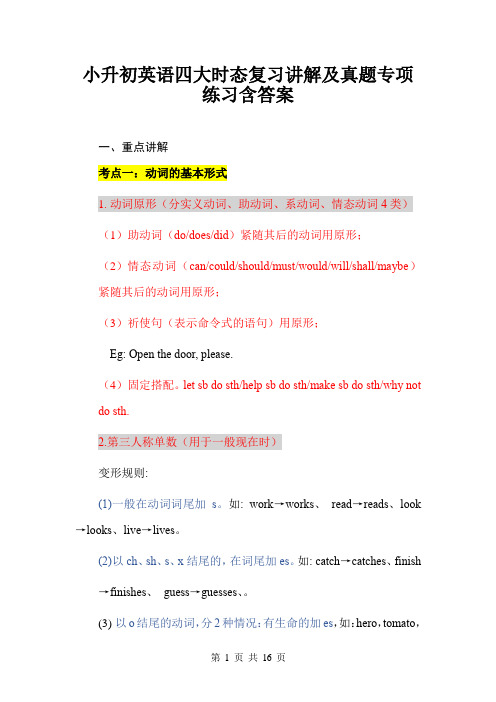
小升初英语四大时态复习讲解及真题专项练习含答案一、重点讲解考点一:动词的基本形式1.动词原形(分实义动词、助动词、系动词、情态动词4类)(1)助动词(do/does/did)紧随其后的动词用原形;(2)情态动词(can/could/should/must/would/will/shall/maybe)紧随其后的动词用原形;(3)祈使句(表示命令式的语句)用原形;Eg: Open the door, please.(4)固定搭配。
let sb do sth/help sb do sth/make sb do sth/why not do sth.2.第三人称单数(用于一般现在时)变形规则:(1)一般在动词词尾加s。
如: work→works、read→reads、look →looks、live→lives。
(2)以ch、sh、s、x结尾的,在词尾加es。
如: catch→catches、finish→finishes、guess→guesses、。
(3)以o结尾的动词,分2种情况:有生命的加es,如:hero,tomato,potato;没有生命的加s,如:radio,photo。
(4)以辅音字母加y结尾的动词,变y为ies。
如: fly→flies、study →studies、carry→carries.(5) 不规则变化。
如: have→has ,are→is,were→was3.现在分词(用于现在进行时)变形规则:(1)一般在动词后加ing。
如: work→working、read→reading、look →looking、wait→waiting。
(2)以不发音的e结尾的动词,去掉e,再加ing。
如: smile→smiling、move→moving、take→taking、write→writing。
(3)以重读闭音节结尾的且词尾只有一个辅音字母的,双写这个辅音字母加ing。
如: sit→sitting、stop→stopping、cut→cutting、run →running、swim→swimming.(4)少数几个以ie结尾的动词,将ie改为y加ing。
小升初英语时态专项复习及答案
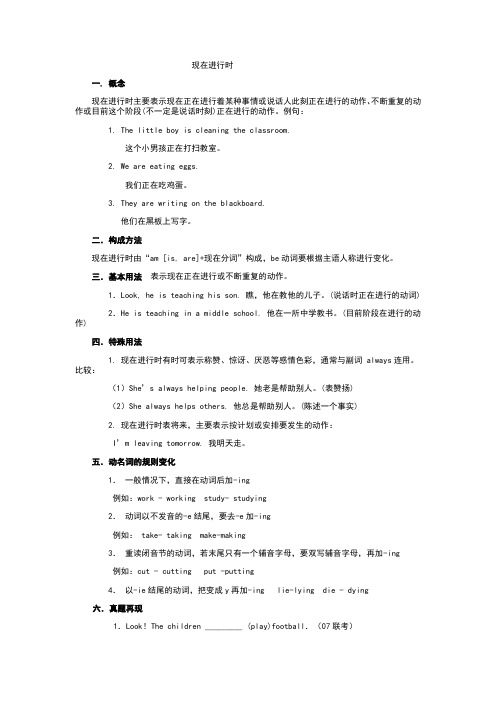
现在进行时一. 概念现在进行时主要表示现在正在进行着某种事情或说话人此刻正在进行的动作、不断重复的动作或目前这个阶段(不一定是说话时刻)正在进行的动作。
例句:1. The little boy is cleaning the classroom.这个小男孩正在打扫教室。
2. We are eating eggs.我们正在吃鸡蛋。
3. They are writing on the blackboard.他们在黑板上写字。
二.构成方法现在进行时由“am [is, are]+现在分词”构成,be动词要根据主语人称进行变化。
三.基本用法表示现在正在进行或不断重复的动作。
1.Look, he is teaching his son. 瞧,他在教他的儿子。
(说话时正在进行的动词) 2.He is teaching in a middle school. 他在一所中学教书。
(目前阶段在进行的动作)四.特殊用法1. 现在进行时有时可表示称赞、惊讶、厌恶等感情色彩,通常与副词 always连用。
比较:(1)She’s always helping people. 她老是帮助别人。
(表赞扬)(2)She always helps others. 他总是帮助别人。
(陈述一个事实)2. 现在进行时表将来,主要表示按计划或安排要发生的动作:I’m leaving tomorrow. 我明天走。
五.动名词的规则变化1.一般情况下,直接在动词后加-ing例如:work - working study- studying2.动词以不发音的-e结尾,要去-e加-ing例如: take- taking make-making3.重读闭音节的动词,若末尾只有一个辅音字母,要双写辅音字母,再加-ing例如:cut - cutting put -putting4.以-ie结尾的动词,把变成y再加-ing lie-lying die - dying 六.真题再现1.Look!The children _________ (play)football.(07联考)2.Look! The baby panda _________ (get) down from the tree.(08联考)若句中出现look, listen等词,说明此动作正在发生或进行,一般情况下用现在进行时态,所以正确答案分别为: playing gettingare you _________, Andy ---Mum. (10联考)A. waitB. waitingC. waiting forD. wait for根据现在进行时的构成可排除A和 D选项,本题考查wait for+等候的对象这一用法,故选C.精点精练一、用动词的正确形式填空。
小升初英语时态综合总复习训练题附参考答案及解析
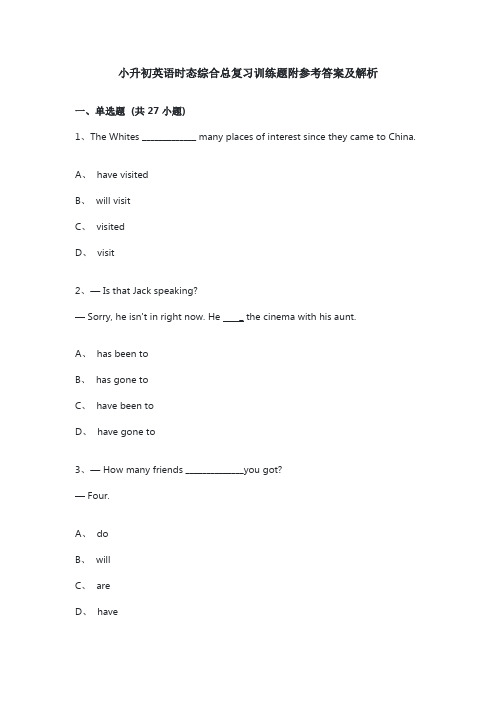
小升初英语时态综合总复习训练题附参考答案及解析一、单选题(共 27 小题)1、The Whites _____________ many places of interest since they came to China.A、have visitedB、will visitC、visitedD、visit2、— Is that Jack speaking?— Sorry, he isn't in right now. He _ the cinema with his aunt.A、has been toB、has gone toC、have been toD、have gone to3、— How many friends ______________you got?— Four.A、doB、willC、areD、have4、--What if you don't finish your work on time? -- Mrs. Brown will be very angry.A、happensB、is happenedC、happenedD、will happen5、Some people were _________ the river in a boat.A、 crossedB、 crossingC、 crosingD、 crosses6、He ________ cereal for breakfast yesterday.( )A、haveB、ateC、makes7、I _____ my hat yesterday.( )A、forgetB、forgotC、to forget8、Long ago, a little baby ____ born. ( )A、wereB、wasC、is9、Yesterday we ____ a lot of Christmas gifts.( )A、buyB、boughtC、buying10、A woman ________ to the store and ________ a dress.( )A、went; buyB、goes; buyC、went; boughtD、go; buy11、Jenny ____ cereal for breakfast yesterday. ( )A、ateB、eatC、eating12、Santa ____ them gifts yesterday. ( )B、broughtC、to bring13、He ____ people to love each other. ( )A、taughtB、teachC、teaching14、Yesterday we ____ gifts,( )A、boughtB、buyC、to buy15、I _______ home to China next week.A、flyB、will flyC、fly toD、fly for16、I ______________ go to the market (市场) to buy some fruit. ( )A、amB、isD、will17、I ____ 12 years old next year.( )A、amB、will beC、wasD、is18、Uncle Li ____ learn English next year.( )A、isB、going toC、is goD、is going to19、What are you going to _____________next week? ( )A、doB、didC、doesD、doing20、Jenny ____ cereal for breakfast yesterday.( )A、eatB、ateC、eats21、Kim ____ her father wash the dishes.( )A、helpB、helpsC、help to22、She ____ to learn English. ( )A、wantB、wantesC、wants23、It ____ her name on it!( )A、hasB、haveC、haven't24、They are ____ the newspaper.( )A、readB、to readC、reading25、She is _____ home now.A、going toB、go toC、going26、Mum is _____ eggs.A、cookB、cookingC、to cook27、Are they _____ cards? ( )A、playsB、playingC、played二、填空题(共 3 小题)1、用所给单词的适当形式填空。
六年级下册英语试题-小升初专项训练之语法时态 (含答案解析) 通用版

六年级下册小升初英语专项训练-语法时态通用版(含答案解析)一、单选题1.Li Bing asked ________ to play table tennis with him.A. IB. hisC. her2.She wrote a book about________.A. himselfB. herselfC. yourself3.Winter is cold and________.A. snowB. snowyC. snows4.Look,the keys on the sofa.A. isB. it'sC. are5.This is the report. It’s warm today.A. weatherB. classC. library6.Mr. Li knows about the party ________ Jack doesn't.A. andB. butC. or7.I _______ TV on Sunday.A. watchesB. watchC. watching8.My sister wants ________ a star.A. isB. beC. to be9.You _______ tall.A. isB. amC. are10.We planned ________ a football game.A. to playB. playC. playing11.Tim's mother_______ angry because Tim_______ homework yesterday.A. is, isn't doingB. did, didn't doC. was, didn't do12.What did you ________ in Japan last week?A. boughtB. buyC. buying13.What do you have ________ the afternoon?A. inB. onC. at14.—What's Bob doing?—Yes,he is.A. Where is he?B. Is he watching TV?C. What did he do?15.Look, this________ my school.A. amB. isC. are16.—What are the boys doing?—They ______.A. play footballB. playing footballC. are playing football.17.Does he want to____ your pen friend?A.isB.areC.be18.I am ______Chinese now .A. learnB. learningC. learnt19.—Will you fly a kite next week?—________A. Yes,I will.B. No,I won't.20.The monkey is playing ________ its mother.A. withB. andC. of二、判断题21.We are reading books in the classroom.22.The boy helped the girl in Chinese.23.北京今天天气温暖, 你可以这样告诉朋友:It's warm in Beijing today.24.These are my shoes.25.She wrote me a message. It said,“I go to the supermarket.”三、填空题26. 猜出相应的季节。
小升初英语时态专项复习及答案
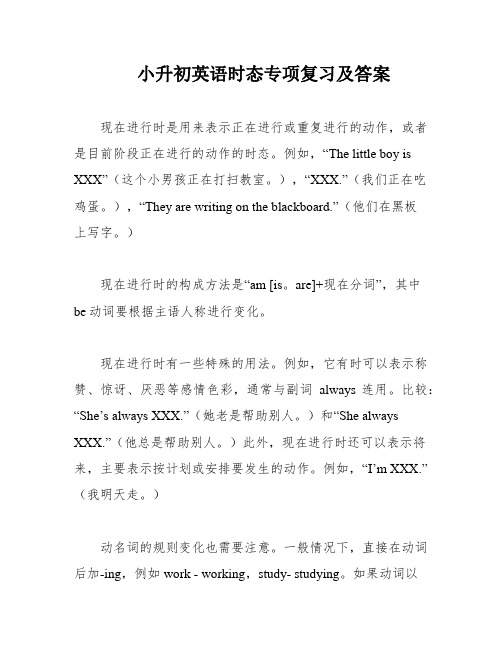
小升初英语时态专项复习及答案现在进行时是用来表示正在进行或重复进行的动作,或者是目前阶段正在进行的动作的时态。
例如,“The little boy is XXX”(这个小男孩正在打扫教室。
),“XXX.”(我们正在吃鸡蛋。
),“They are writing on the blackboard.”(他们在黑板上写字。
)现在进行时的构成方法是“am [is。
are]+现在分词”,其中be动词要根据主语人称进行变化。
现在进行时有一些特殊的用法。
例如,它有时可以表示称赞、惊讶、厌恶等感情色彩,通常与副词always连用。
比较:“She’s always XXX.”(她老是帮助别人。
)和“She always XXX.”(他总是帮助别人。
)此外,现在进行时还可以表示将来,主要表示按计划或安排要发生的动作。
例如,“I’m XXX.”(我明天走。
)动名词的规则变化也需要注意。
一般情况下,直接在动词后加-ing,例如work - working,study- studying。
如果动词以不发音的-e结尾,要去-e加-ing,例如take- taking,make-making。
对于重读闭音节的动词,若末尾只有一个辅音字母,要双写辅音字母,再加-ing,例如cut - cutting,put -putting。
以-ie结尾的动词要把变成y再加-ing,例如lie-lying,die - dying。
现在进行时的真题再现包括“Look!XXX XXX.”(瞧,孩子们正在踢足球。
)和“Look。
XXX XXX down from the tree.”(瞧,小熊猫正在从树上下来。
)1.XXX is XXX.2.I am watching TV right now.3.She is working in a hospital.4.Kitty and Ben are having XXX XXX.5.His father is able to help them.6."Danny。
2021小升初英语总复习第五讲时态知识点讲解+练习.docx

第五讲:时态—、【考点解读】英语中,人们在句子表达的过程中,随着时间的变化,谓语动词的形式会发生相应的变化,称之为时态。
动词时态共有十六种,小升初常考的时态有五种:一般现在时;一般将来时;一般过去时;现在进行时;现在完成时。
小升初考试中要求掌握五种时态的概念、动词变化规则、标志词、句型变化等,重点民办学校在分班考中都会涉及五种时态的用法。
二、【知识讲解】五大时态的区别:知识点1——一般现在时一般现在时主要表示现在时间内和与现在时间有联系的时间内发生的动作或存在的状B ----- —般现在时的标志词★★★★★频度副词 -often, usually, always, sometimes, never, seldom,once a week, twice a year, ★时间词组:every week/day/y ear/month... on Sundays, in January,in the morning 等。
知识点2 --------- 般过去时A—般过去时的运用(概念解读)B 一般过去时的句型构成形式C 一般过去时的标志词★★★★①... ago (two days ago/ 10 minutes ago/ long ago 等,表示一段时间的词或词组)②yesterday, the day before yesterday (带有yesterday 的词或词组)(3)last... (last week/year/night/month 等名词)@ just now, at the age of... , once upon a time,(从前,很久以前),then(那时),on that day (在那天)⑤用When引导的过去时态的句子做句子中的时间状语知识点3——一般将来时A 一般将来时的运用(概念解读)★在时间状语从句和条件句中,常用一般现在时代替一般将来时(参看一般现在时态讲义)。
小升初英语四大时态复习讲解及真题专项练习含答案

小升初英语四大时态复习讲解及真题专项练习含答案一、重点讲解考点一:动词的基本形式1.动词原形(分实义动词、助动词、系动词、情态动词4类)(1)助动词(do/does/did)紧随其后的动词用原形;(2)情态动词(can/could/should/must/would/will/shall/maybe)紧随其后的动词用原形;(3)祈使句(表示命令式的语句)用原形;Eg: Open the door, please.(4)固定搭配。
let sb do sth/help sb do sth/make sb do sth/why not do sth.2.第三人称单数(用于一般现在时)变形规则:(1)一般在动词词尾加s。
如: work→works、read→reads、look →looks、live→lives。
(2)以ch、sh、s、x结尾的,在词尾加es。
如: catch→catches、finish→finishes、guess→guesses、。
(3)以o结尾的动词,分2种情况:有生命的加es,如:hero,tomato,potato;没有生命的加s,如:radio,photo。
(4)以辅音字母加y结尾的动词,变y为ies。
如: fly→flies、study →studies、carry→carries.(5) 不规则变化。
如: have→has ,are→is,were→was3.现在分词(用于现在进行时)变形规则:(1)一般在动词后加ing。
如: work→working、read→reading、look →looking、wait→waiting。
(2)以不发音的e结尾的动词,去掉e,再加ing。
如: smile→smiling、move→moving、take→taking、write→writing。
(3)以重读闭音节结尾的且词尾只有一个辅音字母的,双写这个辅音字母加ing。
如: sit→sitting、stop→stopping、cut→cutting、run →running、swim→swimming.(4)少数几个以ie结尾的动词,将ie改为y加ing。
2020年小升初六年级英语核心考点专项考点精讲+典题突破 专题05《时态》(通用版含答案)
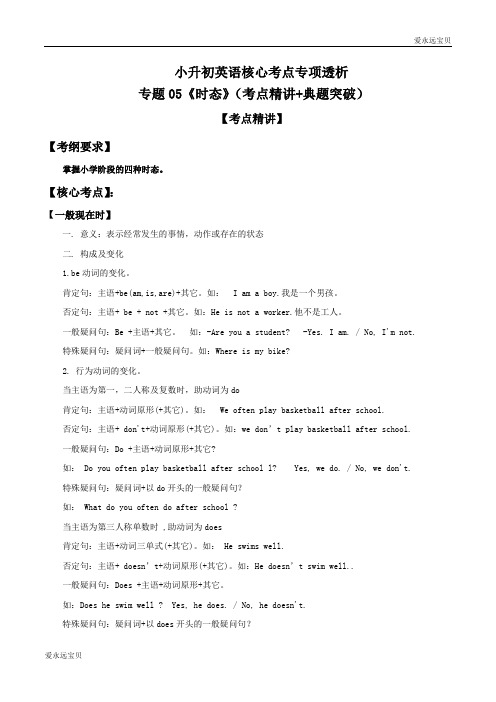
小升初英语核心考点专项透析专题05《时态》(考点精讲+典题突破)【考点精讲】【考纲要求】掌握小学阶段的四种时态。
【核心考点】:【一般现在时】一. 意义:表示经常发生的事情,动作或存在的状态二. 构成及变化1.be动词的变化。
肯定句:主语+be(am,is,are)+其它。
如:I am a boy.我是一个男孩。
否定句:主语+ be + not +其它。
如:He is not a worker.他不是工人。
一般疑问句:Be +主语+其它。
如:-Are you a student? -Yes. I am. / No, I'm not.特殊疑问句:疑问词+一般疑问句。
如:Where is my bike?2. 行为动词的变化。
当主语为第一,二人称及复数时,助动词为do肯定句:主语+动词原形(+其它)。
如:We often play basketball after school.否定句:主语+ don't+动词原形(+其它)。
如:we don’t play basketball after school.一般疑问句:Do +主语+动词原形+其它?如: Do you often play basketball after school l? Yes, we do. / No, we don't.特殊疑问句:疑问词+以do开头的一般疑问句?如: What do you often do after school ?当主语为第三人称单数时 ,助动词为does肯定句:主语+动词三单式(+其它)。
如: He swims well.否定句:主语+ doesn’t+动词原形(+其它)。
如:He doesn’t swim well..一般疑问句:Does +主语+动词原形+其它。
如:Does he swim well ? Yes, he does. / No, he doesn't.特殊疑问句:疑问词+以does开头的一般疑问句?如: How does your father go to work?三.第三人称单数的动词变化规则(只有在第三人称为主语的肯定句中,动词才用三单式)(1)多数动词直接加s:runs gets likes collets takes plays climbs…….(2)结尾是s, x, sh, ch, o,前为辅音字母,结尾加es :watches teaches goes does washes crosses mixes brushes(3)动词末尾y前为辅音:将y改为i加es: study→studies fly→flies carry→carries cry→cries但在y前如果为元音则直接加s:buys says四.时间标志:always , usually , often , sometimes ,every…【现在进行时】一.意义——当表示现在正在进行的动作或正在发生的事。
word完整版小升初四大时态及习题
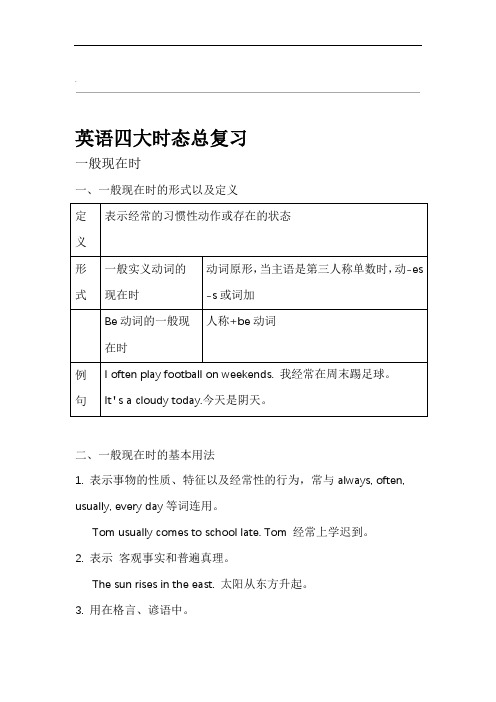
.英语四大时态总复习一般现在时一、一般现在时的形式以及定义二、一般现在时的基本用法1. 表示事物的性质、特征以及经常性的行为,常与always, often, usually, every day等词连用。
Tom usually comes to school late. Tom 经常上学迟到。
2. 表示客观事实和普遍真理。
The sun rises in the east. 太阳从东方升起。
3. 用在格言、谚语中。
No pains, no gains.不劳而获。
一般过去时一、一般过去时的定义以及形式..二、一般过去时的基本用法与常态,存作或在的状间表示在过去的时里发生的动1.等连用。
yesterday, last night, several years ago I took a bus to school last Friday.上周五我坐公交车去上学。
2. 表示在过去的某段时间里,经常或反复发生的动作或状态。
他们去年经常晚饭They had a walk after supper last year.后散步。
一般将来时一、一般将来时的定语以及形式二、一般将来时的基本用法常与将来的时间状语1. 表示将来某个时间要发生的动作或状态,tomorrow, next week等连用。
..She will be back tomorrow.她明天就回来。
2. 表示将来某一时间内经常发生的动作或状态。
We'll have a test every Monday this year. 今年的每一个周一我们都有考试。
巧学妙计Be going to 指当前已计划过或思考过的意图和打算;will/shall 表示未事先思考或未计划的意图。
Be going to 还可以表明马上要发生,而will则表明说话者的观点、主观意识。
I'm going to visit mu aunt this week. 我打算这周去看望姑姑。
(完整版)小升初英语总复习----四种时态专项训练(精编)
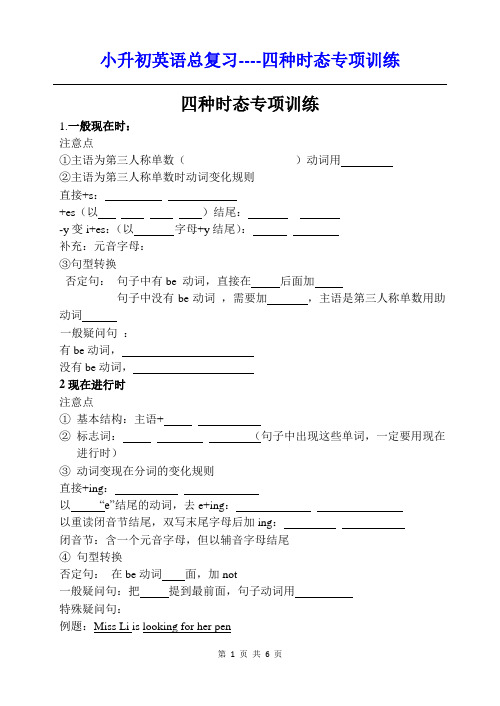
四种时态专项训练1.一般现在时:注意点①主语为第三人称单数()动词用②主语为第三人称单数时动词变化规则直接+s:+es(以)结尾:-y变i+es:(以字母+y结尾):补充:元音字母:③句型转换否定句:句子中有be 动词,直接在后面加句子中没有be动词,需要加,主语是第三人称单数用助动词一般疑问句:有be动词,没有be动词,2现在进行时注意点①基本结构:主语+②标志词:(句子中出现这些单词,一定要用现在进行时)③动词变现在分词的变化规则直接+ing:以“e”结尾的动词,去e+ing:以重读闭音节结尾,双写末尾字母后加ing:闭音节:含一个元音字母,但以辅音字母结尾④句型转换否定句:在be动词面,加not一般疑问句:把提到最前面,句子动词用特殊疑问句:例题:Miss Li is looking for her pen①②对①进行提问:对②进行提问:3一般过去时:注意点④句型转换否定句:主语+ (没有be动词)主语+ (有be动词)一般疑问句:以开头(没有be动词)以开头(有be动词)特殊疑问句:特殊疑问词+ + + ?(没有be动词)例题翻译:你家过去在哪里?4,一般将来时注意点①基本结构:主语+②标志词:next+年,月,日③句型转换:否定句:在be动词面加not他下周打算去公园吗?(一般疑问句)他下周打算去哪里?(特殊疑问句)④翻译:下周它将会是:_________ did you ________ the birds?2. Then, he let the boy go.(改为否定句)Then,he _______ ________ the boy go.3. They could play football.(改为一般疑问句,并作肯定回答)----________ they play football? ----Yes, they _________.4. Nancy lives in Nanjing now.(用last year 改写句子)Nancy _______ in Nanjing last year.5.I went to a shopping centre last Sunday.(改为一般疑问句,并作否定回答)---______ you ______ to a shopping centre last Sunday? ---No, I _________.6. He puts his things in order. (改为一般疑问句)___________________________________________________7. Did you go to bed late last night? (改为陈述句)____________________________________________________8. They often do their homework in the evening. (用she替换they)____________________________________________________9. You should put your books and toys on the floor. (改为否定句)_____________________________________________________10. He feels sleepy in the morning. (对划线部分提问)____________________________________________________11. This is Bobby’s bedroom. (对划线部分提问)____________________________________________________12. have, my, time, breakfast, I, always, on (.) (连词成句)____________________________________________________.13. The, out, the, get, lion, mouse, helped (.) (连词成句)____________________________________________________. 14. A monkey woke the tiger up.(改成一般疑问句)__________________________________________________15. Sam brings some water.(改成否定句)__________________________________________________16. Mike has some bread and milk for breakfast. (对划线部分提问)__________________________________________________17. The man sings well. (对划线部分提问)18. too, you, cola, much, drink, shouldn’t (.) (连词成句)______________________________________________________20 The children must play football on the road.(改为否定句)______________________________________________________ 21. We must look out for the traffic lights first.(对划线部分提问)______________________________________________________ 22. An old woman is crossing the road.(对划线部分提问)______________________________________________________ 23. You can’t watch TV now because it’s late. (对划线部分提问)______________________________________________________ 24. keep, desk, tidy, I, must, my, clean, and (.)(连词成句)______________________________________________________二用所给词的适当形式填空1.Let (we )(play) basketball this afternoon.2. (Be)your sister (visit) your parents tomorrow?3.Yang Ling is going to (make) clothes for her dolls.4. (child) Day is on the first of June.5. Tim usually (brush) his teeth in the morning.6.I (have) a birthday party last year.7.Tomorrow is Dragon Boat Festival. We (watch )a dragon boat race.8. They (eat) moon cakes last Mid-Autumn Festival?9.My parents ( watch) TV in the living room now.10. Your birthdayis coming. I (make) a cake for you.11.Let’s(play) the piano together.12.How many ( visit) are there in your group?13.My sister wants ( learn) about in England.14.My uncle is from ( Chinese).15.Animal ( love) will go to see them quickly.16.Jack (go )and look for his parents next week.17. (visit) from the US are very friendly.18.The girls ( learn) an English song next week.19.The students are very (excite).Because the game is very (e xcite).20.My mother likes ( listen)to music after dinner.21.He ( read) a book last night.22.Lucy is going to ( find) a book about e- cards.23.I (eat) some bread for breakfast yesterday.24.Can I ( have) an English book?25.We (are) twelve years old last year.26.I want (buy )a computer.27.What ( be) your parents going to do this weekend?28.We (fly) kites tomorrow.29.The boy ( come) to my house the day after tomorrow.30.What about (go )for a picnic next week?31. Mary’s birthday is next Monday, her mother (give) her a present.32.My mother ( buy) some snacks and drinks this morning.33. (Be) your family going to climb the hill next Sunday?34.Now, Bobby ( wear) his new clothes.35.This lesson (end) at half past eleven. Then you can have lunch.35. It is very cold these days . It (snow) tomorrow.36.-- You ( come here again next Saturday?---No. I (visit) my teacher.37.Hurry up! or we (be )late.38.--What you ( do) tomorrow afternoon?--I (see )a film with my friend.39.---Can you come and ( help )me with my English ,mum?。
【通用版】小升初英语复习:时态-考点解读与专项训练(Word版,含答案)

小学英语时态综合训练一、用动词的正确形式填空1. I ________ (do) my homework every evening.2. We _______ (fly) kites in the park on Sundays.3. My mother ________ (clean) our room on Sundays.4. Tom _______(play) the piano every Saturday. Now he______ (play).5. She _______(like) swimming. She ______ (swim) this weekend.6. Usually my mother _______(wash) the dishes after lunch. But my grandma ______ (wash) today.7. Look at the man! He ______ (read) a magazine.8. Look! The plane ________ (fly) over the building.9. Listen! My aunt ________ (sing) in the room.She is a singer. She _____ (like) singing. She _______(have) a music show. She is excited.10. Tom and Mike always ______ (swim) in the river. They _____ (swim) in the swimming pool this Sunday. Look! They ______ (swim).11. What ______ you usually ______ (do) in the evening?I _______ (play) computer games.12. What _______ you _______ (do) now?I _______ (make) a paper plane.13. What _______ he _______ (do)?He ______ (dance).14. What _______ she ______ (do) yesterday?She ______ (visit) her grandparents.15. ______ your mother ______ (read) newspaper in the morning?Yes, She ________ .16. _______ you _______ (like) fishing?No, I ______ . I like ______ (swim),but my brother ______ (like). 17. How ______ your father _______ (go) to work every day?He ______ (go) by bike. But it’s cold today. He ______ (take) the No.21 bus,, and he _______ (go) to work by taxi yesterday.18. _______ the monkey _______ (like) climbing trees? Yes, it _______ .19. What _______ your father ______ (do) after lunch? He _______ (read)a comic book. What _____ he _______(do) today? He _______ (clean) thekitchen for my grandma. Look! He (clean).20. ________ you ______ (collect) stamps? Yes. I _______ .________ your brother ______ (collect), too? No, he ________ .二、选择题1. _____ he _____ to the park at 6:30 in the morning? No,he _____ .A. Does; goes; doesB. Does; go; doesn’tC. Does; go; does2. What colour _____ you _____ this bookcase? I _____ it pink.A. are; going to paint; am going to paintB. do; paint; paintC. did; paint; painted3. Tim always _____ a picture at home. He _____ a car now.A. draws; is drawingB. draw; drawC. draws; draw4. She usually _____ her friends. They often _____ tea.A. see; drinkB. sees; drinksC. sees; drink5. He usually _____ the dishes at night, but tonight he _____ clothes.A. wash; washB.washes; is going to washC. is washing; washes6. Mr. Green usually _____ his newspaper in the evening, but he and his wife _____ television yesterday evening.A.reads; watchesB.reads; is going to watchC.reads; watched7. Where are the man and the woman? They _____ near the tree.A. sitB. satC. are sitting8. _____ your pen pal _____ diving? No, he _____ .He ______ writing stories.A. Does; like; doesn’t; likesB. Does; likes; doesn’t; likeC. Do; like; don’t; likes9. _____ you _____ fishing yesterday? No, we _____ .A. Does; go; doesn’tB. Did; go; didn’tC. Do; go; don’t10. Open the window, Please. Look! He _____ it.A. opensB. is openningC. is opening11. I usually _____ some milk every day. But I _____ coffee yesterday.A. drink; drankB. is drinking; drinkC. drank; am drinking12. Mr. Green often _____ his newspapers at night. But he _____ an interesting book tonight.A. reads; readsB. reads; readC. reads; is going to read13. The old man _____ playing sports in the park. He _____ morning exercise now.A. likes; is doingB. likes; doesC. like; doing14. What _____ you usually _____ in the evening? I ______ computer games. What _____ you _____ last night? I _____ a book.A. do; do; playB. did; do; playedC. does; do; playsdid; do; read do; do; read do; do; am reading15. Where ______ the boy _____ ? He _____ across the river now.A. does; swim; swimsB. is; swimming; is swimmingD. is; swimming; is swimming16. _____ you _____ to music now? Yes, we _____ .A. Do; listen; doB. Did; listen; didC. Are; listening; are17. Put on you coat, please. OK. I ______ it on.A. am puttingB. am going to putC. put18. _____ you ______ coffee? Yes, I ______ .A. Do; like; doB. Did; like; didC. Are; like; am19. Look! Two cats ______ across the wall.A. runB. runsC. are running20. She _____ tea, but he _____ .A. likes; doesn’t B; like; don’t C. like; doesn’t。
小升初英语复习专题——时态(含答案)

6.have h__a_s_____ 7.see _s_e_e__s___ 8.come c_o_m__e_s___ 9.watch w_a__tc__h_e_s_ 10.eat _e_a__ts____
ha_v_i_n__g___
se__e_in__g___ co_m__i_n_g___ w__a_t_c_h_i_n_g e_ating_______
行
他).
时
一般疑问句:Am/Is/Are+主语
Is he watching TV now? 他现在在看电视吗?
+动词-ing(+其他)?
2.现在进行时的基本用法 用法
例句
当句子中有 now 时,常表示动作正在进行, 这时要用现在进行时。
They are dancing now. 他们现在正在跳舞。
is going/will go
【解析】 解答此类题要抓住关键词。 第1题中关键词为now,应用现在进行时,又因主语为I,be动词应 用am。 第2题由yesterday morning可知应用过去时,get的过去式为got。 第3题由sometimes可知应用一般现在时,Tom为第三人称单数,应 用help的第三人称单数helps。 第4题由next week可知应用将来时,将来时有两种情势“be going to”与“will+动词原形”。
我明天去。
Will he come? 他(会)来吗?
Where shall we meet? 我们在哪见面?Fra bibliotek单项选择。
( )1.—Does Lucy watch TV every evening? —________. A.Yes, he does B.Yes, he doesn't C.Yes, she does D.No, she does
小升初英语知识专项训练(时态与句法)14.一般将来时_通用版
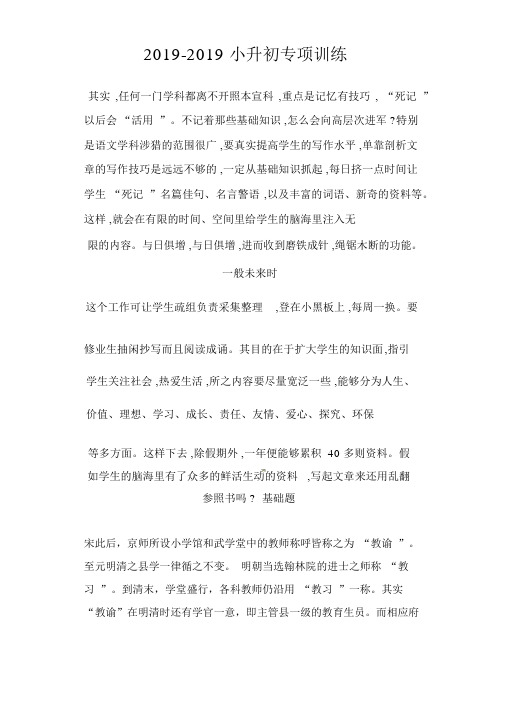
2019-2019 小升初专项训练其实,任何一门学科都离不开照本宣科,重点是记忆有技巧, “死记”以后会“活用”。
不记着那些基础知识 ,怎么会向高层次进军 ?特别是语文学科涉猎的范围很广 ,要真实提高学生的写作水平 ,单靠剖析文章的写作技巧是远远不够的 ,一定从基础知识抓起 ,每日挤一点时间让学生“死记”名篇佳句、名言警语 ,以及丰富的词语、新奇的资料等。
这样 ,就会在有限的时间、空间里给学生的脑海里注入无限的内容。
与日俱增 ,与日俱增 ,进而收到磨铁成针 ,绳锯木断的功能。
一般未来时这个工作可让学生疏组负责采集整理,登在小黑板上 ,每周一换。
要修业生抽闲抄写而且阅读成诵。
其目的在于扩大学生的知识面,指引学生关注社会 ,热爱生活 ,所之内容要尽量宽泛一些 ,能够分为人生、价值、理想、学习、成长、责任、友情、爱心、探究、环保等多方面。
这样下去 ,除假期外 ,一年便能够累积 40 多则资料。
假如学生的脑海里有了众多的鲜活生动的资料 ,写起文章来还用乱翻参照书吗 ? 基础题宋此后,京师所设小学馆和武学堂中的教师称呼皆称之为“教谕”。
至元明清之县学一律循之不变。
明朝当选翰林院的进士之师称“教习”。
到清末,学堂盛行,各科教师仍沿用“教习”一称。
其实“教谕”在明清时还有学官一意,即主管县一级的教育生员。
而相应府和州掌管教育生员者则谓“教授”和“学正”。
“教授”“学正”和“教谕” 的帮手一律称“训导”。
于民间,特别是汉代此后,关于在“校”或“学”中教授经学者也称为“经师”。
在一些特定的讲学场合,比方书院、第 1页 /共 22页皇室,也称教师为“院长、西席、讲席”等。
一、选择题1.There _______ a party in the company tomorrow evening .A.wasB.is going to haveC.will haveD.is going to be2.He _______ very upset this week, he _______ better next week.A.will be; isB.is; isC.will be; will beD.is; will be3.If they come, we _______ a meeting .A.haveB.will haveC.hadD.would hav e4.— _______ you on holiday soon ?—-No, I _______ on holiday next month.A.Are; going to; willB.Are; going to be; willC.Are; going to; will beD.Are; going to be; will be 5.— Where is the morning paper?— I _______ it for you at once.A.getB.am gettingC.to getD.will get6._______ a concert next Saturday?A.There will beB.Will there beC.There can beD.There are7.Lily _______ me a nice gift on my next birthday .A.will givesB.will giveC.givesD.give 8.There _______ a meeting tomorrow afternoon.A.will be going toB.will going to beC.is going to beD.will go to be9.() --- _______ youon holiday soon?---N o, I _______ on holiday next month.A. Are; going to; willB. Are; going to be; willC. Are; going to; will beD.Are; going to be; will be 10.() He _______ very upset this week, he _______ better next week.A. will be; isB. is; isC. will be; will beD. is; will be11.() There _______ a party in the company tomorrow evening.A. wasB. is going to haveC. will haveD. is going to be第 3页 /共 22页12.() There _______ a meeting tomorrow afternoon. A. will be going to B. will going to beC. is going to beD. will go to be13.() Lily _______ me a nice gift on my next birthday.A. will givesB. will giveC. givesD. give14.() — Where is the morning paper?— I _______ it for you at once.A. getB. am gettingC. to getD. will get15. Peter _______ here next month.A.isn ’ t workingB.doesn ’ t workingC.isn ’ t going to workingD.won’ t work 16.() _______ a concert next Saturday?A. There will beB. Will there beC. There can beD. There are17.() If they come, we _______ a meeting.A. haveB. will haveC. hadD. would have18.() Peter _______ here next month.A. isn’ t workingB. doesn’ t workingC.isn ’ t going to workingD. won’ t work 19.What did you see _______?A.nowB.every dayC.nowadaysD.just now20.— Shall I buy a cup of tea for you?— _______.A.No, you won’ tB.No, you aren’tC.No, please don’ tD.No, please21. When _______ Lee _______ school this morning? A.did; got to B.did; get toC.does; getD.did; got二、阅读理解22.阅读短文 ,判断正 (T) 误(F)。
小升初英语专项复习讲与练- 时态 通用版(word版,含答案)
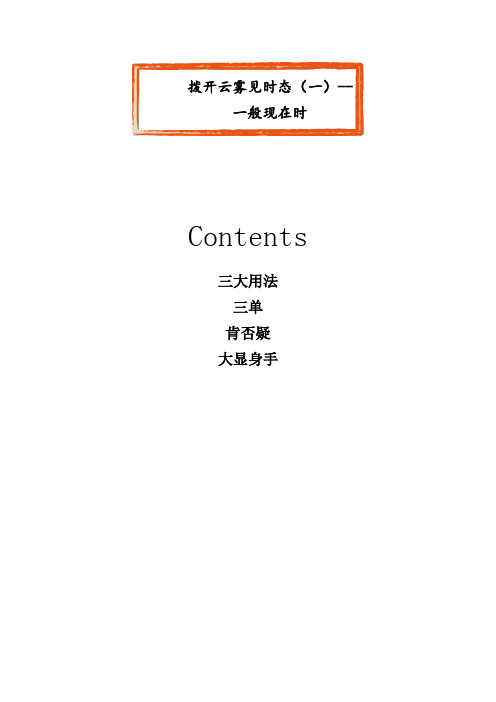
拨开云雾见时态(一)--一般现在时Contents三大用法三单肯否疑大显身手一般现在时三大用法规律性的动作 Xiao Fan has three bowls of rice for dinner on Fridays.Da Qiang sleeps with the duck every day.现在的状态 I am a teacher.You are a student.He is a policeman.There is a snake.真理 The sun is bigger than the earth.The earth travels around the sun.三单动词第三人称单数变化规则一般:加s二般:以s、x、ch、sh、o结尾,加es三般:以辅y结尾,变y为i加es四特:have→has三单使用条件不是我,不是你,并且只有一个肯定句、否定句、疑问句I am a teacher. He is 30 years old. We are clever.I am not a dancer. He is not 13 years old. We are not stupid. Are you a teacher? Is he 30 years old? Are you clever?I eat 2 eggs every day.I don’t eat 2 eggs every day.Do you eat 2 eggs every day?She eats 20 eggs a week.She doesn’t eat 20 eggs a week.Does she eat 20 eggs a week?大显身手1.We often ___________ (play) in the playground.2.He _________ (get) up at six o’clock.3.Danny (study) English, Chinese, Maths, Science and Art at school. 4.She often __________ (watch) TV with her dog.5.__________ you_________ (brush) your teeth every morning?6.What (do) he usually (do) after school?1.I have many books. (改为否定句)__________________________________________2.Da Shan’s sister likes playing table tennis. (改为否定句)__________________________________________3.I watch TV every day. (改为一般疑问句)__________________________________________4.Yu Paopao is the cleverest student in her class. (改为否定句)__________________________________________Keys:1.play 2.gets 3.studies 4.watches 5.Do, brush 6.does, do 1.I don’t have many books.2.Da Shan’s sister doesn’t like playing table tennis.3.Do you watch TV every day?4.Yu Paopao is not the cleverest student in her class.测试题一、写出下列动词的第三人称单数形式get ________________ sit ________________come ________________ drive _________________fly _________________ study _________________wash _________________ watch _________________go ________________ do _________________二、单项选择1.Where _________ he _________ from?A.is, come B.do, comeC.does, come D.are, from2.We _____________ any Chinese cla sses on Friday.A.don’t has B.doesn’t haveC.don’t have D.are have3.Wang Mei __________ music and often ___________ to music.A.like; listen B.likes; listensC.like; are listening D.liking; listen4.Jenny ____________ in an office. Her parents ____________in a hospital.A.work ; works B.works ; workC.work ; are working D.is working ; work三、句型变化1.Tony watches TV every evening. (改为否定句)_________________________________________.2.Amy likes playing computer games. (改为一般疑问句) _________________________________________?3.Sun Yang washes clothes on Saturday.否定句: __________________________________一般疑问句: ______________________________肯定/ 否定回答 __________________ / __________________Keys:一、gets si ts comes drives fliesstudies washes watches go es does二、CCBB三、1. Tony doesn’t watch TV every evening.2. Does Amy like playing computer games?3. Sun Yang doesn’t wash clothes on Saturday.Does Sun Yang wash clothes on Saturday?Yes, he does. / No, he doesn’t.拨开云雾见时态㈡-- 一般过去时Contents肯否疑动词过去式大显身手一般过去时描述过去发生的事肯定句、否定句、疑问句I was in a quiet street.I was not in a quiet street.Was I in a quiet street? (Were you in a quiet street?)I had a dream last night.I didn’t have a dream last night.Did I have a dream last night? (Did you have a dream last night?) 动词过去式变化规则动词过去式,ed来结尾一般直接加,见e只加d辅y结尾y变i,再加ed重读辅元辅,双写尾字母常见不规则动词过去式大全am, is→wasare→werecut→cuthit→hitlet→letput→putcost→costhurt→hurtread→readfeel→feltmeet→metsmell→smeltfi nd→foundget→gothave→hadhold→heldmake→madesell→soldtell→toldcome→came become→becamerun→ranlearn→learned/learnt hear→heardwin→woncatch→caught teach→taughtbring→broughtbuy→boughtthink→thoughtfly→flewthrow→threwgrow→g rewknow→kneweat→atefall→fellgive→gavetake→tooksee→sawwrite→wroteride→rodedrive→drovebuild→builtlend→lentsend→sentspend→spentlose→lostpay→paidsay→saiddraw→drewshow→showed speak→spokebreak→brokesteal→stolewake→woke choose→ch ose forget→forgotsleep→sleptsweep→sweptstand→stoodunderstand→understoodbegin→beganring→rangsing→sangswim→swamdrink→drankdo→didgo→wentsit→sat时间标志词yesterday …ago last… the day before yesterday just now this morning i n 2008大显身手1.There _________ (be) no one here a moment ago.2.Helen and Nancy _________ (be) good friends, but now they are not. 3.I listened b ut ___________ (hear) nothing.1.How is Jane yesterday? ________2.He go to school by bus last week. ________3.I can fly kites seven years ago. ________4.Did you saw him j ust now. ________5.Tom wasn't watch TV last night. ________6.I did not my homework yesterday. ________Keys:1.was 2.were 3.heard 1.is→was2.go→went3.can→could4.saw→see . →?5.wasn’t→didn’t6.did not后面加do测试题一、写出下列动词的第三人称单数形式、过去式形式go_______ _______ enjoy_______ _______buy_______ _______ like_______ _______get _______ _______ walk_______ _______take_______ _______ dance_______ _______ write_______ _______ run_______ _______swim_______ _______ find_______ _______begin_______ _______ eat_______ _______play_______ _______ study_______ _______ 二、单项选择1.I ______________ my room last Sunday.A.cleaned B.clean C.am cleaning D.cleans2.What ______________ Mike do last weekend?A.do B.does C.is D.did3.______________ you ______________ TV last night.A.Do, watch B.Did, watch C.Did, watched D.Does, watches 4._____________ he ____________ football two days ago?A.Does, play B.Did, played C.Did, play D.Does, playing 5.They _______________ on a trip in February, 2007.A.are going B.going C.went D.goes6.She watered the flowers _______________.A.tomorrow B.sometimesC.yesterday morning D.every morning7.Mike_____________ a big tiger in the nature park last year.A.saw B.see C.seeing D.seen8.------ Good afternoon, Miss Lee. How does Mike feel?------ He’s tired. H e ____________ a lot of work ______________ .A.does, this morning B.do, this morningC.did, this morning D.have, this morning三、找出以下短文中的动词过去式,并将其对应的动词原形写出来The City Mouse and the Country MouseOnce there were two mice. They were friends. One mouse lived in the country; the other mouse lived in the city. After many years the Country mouse saw the City mouse; he said, "Do come and see me at my house in the country." So the City mouse went. The City mouse said, "This food is not good, and your house is not good. Why do you live in a hole in the field? You should come and live in the city. You would live in a nice house made of stone. You would have nice food to eat. You must come and see me at my house in the city."The Country mouse w ent to the house of the City mouse. It was a very good house. Nice food was set ready for them to eat. But just as they began to eat they heard a great noise. The City mouse cried, " Run! Run! The ca t is coming!" They ran away quickly and hid.After some time they came out. When they came out, the Country mouse said, "I do not like living in the city. I like living in my hole in th e field. For it is nicer to be poor and happy, than to be rich and afraid."Keys:goes went enjoys enjoyed buys bought eats ategets got walks walked takes took dances danced writes wrote runs ran swims swam finds found begins began likes likedp lays played studies studied ADBC CCACwere arelived livesaw see拨开云雾见时态㈢-- 一般将来时Contents肯否疑will、be going to大显身手一般将来时描述将来发生的事肯定句、否定句、疑问句Tigers will be a kind of vehicle.Tigers will not be a kind of vehicle. (will not=won’t)Will tigers be a kind of vehicle?Cars will run everywhere.Cars won’t run everywhere.Will cars run everywhere?时间标志词tomorrow soon from now on in the future next+ in+be going to两大用法1 打算做某事I’m going to be a si nger.She is going to learn French.2 根据现象作出推断It’s going to rain.She is going to faint. (她要晕了。
【通用版】小升初英语复习:句型全套-考点解读与专项训练(含答案)
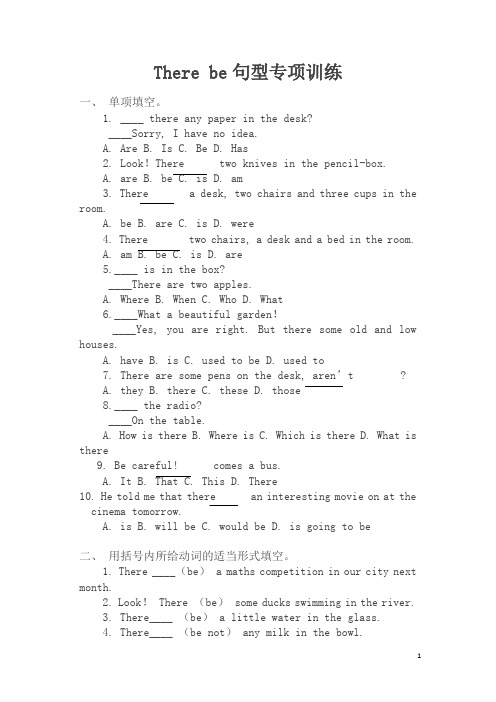
There be句型专项训练一、单项填空。
1. ____ there any paper in the desk?____Sorry, I have no idea.A. AreB. IsC. BeD. Has2. Look!There two knives in the pencil-box.A. areB. beC. isD. am3. There a desk, two chairs and three cups in the room.A. beB. areC. isD. were4. There two chairs, a desk and a bed in the room.A. amB. beC. isD. are5.____ is in the box?____There are two apples.A. WhereB. WhenC. WhoD. What6.____What a beautiful garden!____Yes, you are right. But there some old and low houses.A. haveB. isC. used to beD. used to7. There are some pens on the desk, aren’t ?A. theyB. thereC. theseD. those8.____ the radio?____On the table.A. How is thereB. Where isC. Which is thereD. What is there9. Be careful! comes a bus.A. ItB. ThatC. ThisD. There10. He told me that there an interesting movie on at the cinema tomorrow.A. isB. will beC. would beD. is going to be二、用括号内所给动词的适当形式填空。
六年级下册英语试题-小升初专项训练之语法时态 (含答案解析) 通用版

六年级下册小升初英语专项训练-语法时态通用版(含答案解析)一、单选题1.Li Bing asked ________ to play table tennis with him.A. IB. hisC. her2.She wrote a book about________.A. himselfB. herselfC. yourself3.Winter is cold and________.A. snowB. snowyC. snows4.Look,the keys on the sofa.A. isB. it'sC. are5.This is the report. It’s warm today.A. weatherB. classC. library6.Mr. Li knows about the party ________ Jack doesn't.A. andB. butC. or7.I _______ TV on Sunday.A. watchesB. watchC. watching8.My sister wants ________ a star.A. isB. beC. to be9.You _______ tall.A. isB. amC. are10.We planned ________ a football game.A. to playB. playC. playing11.Tim's mother_______ angry because Tim_______ homework yesterday.A. is, isn't doingB. did, didn't doC. was, didn't do12.What did you ________ in Japan last week?A. boughtB. buyC. buying13.What do you have ________ the afternoon?A. inB. onC. at14.—What's Bob doing?—Yes,he is.A. Where is he?B. Is he watching TV?C. What did he do?15.Look, this________ my school.A. amB. isC. are16.—What are the boys doing?—They ______.A. play footballB. playing footballC. are playing football.17.Does he want to____ your pen friend?A.isB.areC.be18.I am ______Chinese now .A. learnB. learningC. learnt19.—Will you fly a kite next week?—________A. Yes,I will.B. No,I won't.20.The monkey is playing ________ its mother.A. withB. andC. of二、判断题21.We are reading books in the classroom.22.The boy helped the girl in Chinese.23.北京今天天气温暖, 你可以这样告诉朋友:It's warm in Beijing today.24.These are my shoes.25.She wrote me a message. It said,“I go to the supermarket.”三、填空题26. 猜出相应的季节。
小学英语六年级小升初专项复习训练题-时态(附答案)
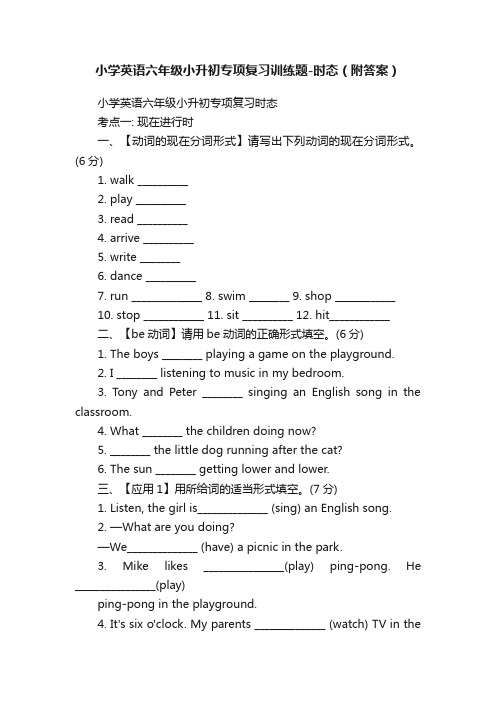
小学英语六年级小升初专项复习训练题-时态(附答案)小学英语六年级小升初专项复习时态考点一: 现在进行时一、【动词的现在分词形式】请写出下列动词的现在分词形式。
(6分)1. walk __________2. play __________3. read __________4. arrive __________5. write ________6. dance __________7. run ______________ 8. swim ________ 9. shop ____________10. stop ____________ 11. sit __________ 12. hit____________二、【be动词】请用be动词的正确形式填空。
(6分)1. The boys ________ playing a game on the playground.2. I ________ listening to music in my bedroom.3. Tony and Peter ________ singing an English song in the classroom.4. What ________ the children doing now?5. ________ the little dog running after the cat?6. The sun ________ getting lower and lower.三、【应用1】用所给词的适当形式填空。
(7分)1. Listen, the girl is______________ (sing) an English song.2. —What are you doing?—We______________ (have) a picnic in the park.3. Mike likes ________________(play) ping-pong. He ________________(play)ping-pong in the playground.4. It's six o'clock. My parents ______________ (watch) TV in theliving room.5. The boys are in the playground. Some______________(run). Some ________(do)the long jump.四、【应用2】根据图片内容,补全句子。
- 1、下载文档前请自行甄别文档内容的完整性,平台不提供额外的编辑、内容补充、找答案等附加服务。
- 2、"仅部分预览"的文档,不可在线预览部分如存在完整性等问题,可反馈申请退款(可完整预览的文档不适用该条件!)。
- 3、如文档侵犯您的权益,请联系客服反馈,我们会尽快为您处理(人工客服工作时间:9:00-18:30)。
小学英语时态综合训练一、用动词的正确形式填空1. I ________ (do) my homework every evening.2. We _______ (fly) kites in the park on Sundays.3. My mother ________ (clean) our room on Sundays.4. Tom _______(play) the piano every Saturday. Now he______ (play).5. She _______(like) swimming. She ______ (swim) this weekend.6. Usually my mother _______(wash) the dishes after lunch. But my grandma ______ (wash) today.7. Look at the man! He ______ (read) a magazine.8. Look! The plane ________ (fly) over the building.9. Listen! My aunt ________ (sing) in the room.She is a singer. She _____ (like) singing. She _______(have) a music show. She is excited.10. Tom and Mike always ______ (swim) in the river. They _____ (swim) in the swimming pool this Sunday. Look! They ______ (swim).11. What ______ you usually ______ (do) in the evening?I _______ (play) computer games.12. What _______ you _______ (do) now?I _______ (make) a paper plane.13. What _______ he _______ (do)?He ______ (dance).14. What _______ she ______ (do) yesterday?She ______ (visit) her grandparents.15. ______ your mother ______ (read) newspaper in the morning?Yes, She ________ .16. _______ you _______ (like) fishing?No, I ______ . I like ______ (swim),but my brother ______ (like). 17. How ______ your father _______ (go) to work every day?He ______ (go) by bike. But it’s cold today. He ______ (take) the No.21 bus,, and he _______ (go) to work by taxi yesterday.18. _______ the monkey _______ (like) climbing trees? Yes, it _______ .19. What _______ your father ______ (do) after lunch? He _______ (read)a comic book. What _____ he _______(do) today? He _______ (clean) thekitchen for my grandma. Look! He (clean).20. ________ you ______ (collect) stamps? Yes. I _______ .________ your brother ______ (collect), too? No, he ________ .二、选择题1. _____ he _____ to the park at 6:30 in the morning? No,he _____ .A. Does; goes; doesB. Does; go; doesn’tC. Does; go; does2. What colour _____ you _____ this bookcase? I _____ it pink.A. are; going to paint; am going to paintB. do; paint; paintC. did; paint; painted3. Tim always _____ a picture at home. He _____ a car now.A. draws; is drawingB. draw; drawC. draws; draw4. She usually _____ her friends. They often _____ tea.A. see; drinkB. sees; drinksC. sees; drink5. He usually _____ the dishes at night, but tonight he _____ clothes.A. wash; washB.washes; is going to washC. is washing; washes6. Mr. Green usually _____ his newspaper in the evening, but he and his wife _____ television yesterday evening.A.reads; watchesB.reads; is going to watchC.reads; watched7. Where are the man and the woman? They _____ near the tree.A. sitB. satC. are sitting8. _____ your pen pal _____ diving? No, he _____ .He ______ writing stories.A. Does; like; doesn’t; likesB. Does; likes; doesn’t; likeC. Do; like; don’t; likes9. _____ you _____ fishing yesterday? No, we _____ .A. Does; go; doesn’tB. Did; go; didn’tC. Do; go; don’t10. Open the window, Please. Look! He _____ it.A. opensB. is openningC. is opening11. I usually _____ some milk every day. But I _____ coffee yesterday.A. drink; drankB. is drinking; drinkC. drank; am drinking12. Mr. Green often _____ his newspapers at night. But he _____ an interesting book tonight.A. reads; readsB. reads; readC. reads; is going to read13. The old man _____ playing sports in the park. He _____ morning exercise now.A. likes; is doingB. likes; doesC. like; doing14. What _____ you usually _____ in the evening? I ______ computer games. What _____ you _____ last night? I _____ a book.A. do; do; playB. did; do; playedC. does; do; playsdid; do; read do; do; read do; do; am reading15. Where ______ the boy _____ ? He _____ across the river now.A. does; swim; swimsB. is; swimming; is swimmingD. is; swimming; is swimming16. _____ you _____ to music now? Yes, we _____ .A. Do; listen; doB. Did; listen; didC. Are; listening; are17. Put on you coat, please. OK. I ______ it on.A. am puttingB. am going to putC. put18. _____ you ______ coffee? Yes, I ______ .A. Do; like; doB. Did; like; didC. Are; like; am19. Look! Two cats ______ across the wall.A. runB. runsC. are running20. She _____ tea, but he _____ .A. likes; doesn’t B; like; don’t C. like; doesn’t。
